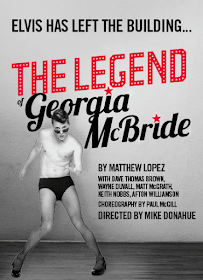The Legend of Georgia McBride is maybe not the deepest show out there, but it's great fun, nonetheless. Performed by a committed cast whose kind, well-meaning characters are impossible not to root for, McBride relies on a few unexpected plot turns and character motivations to steer clear of the cliches it regularly threatens to sink into. I expected to be indifferent about the show at best, but I left hoping everyone else who sees it has as much fun with it as I did. It's a sweet, charming hoot.
The plot: in the rural outskirts of Panama City, Florida, Casey and Jo (Dave Thomas Brown and Afton Williamson, both endearing and believably smitten with one another) are behind on rent and expecting their first child. Jo worries about everything: making money, being responsible adults, bringing a child into the world, educating and caring for it when it arrives. Casey, the eternal optimist, probably doesn't worry enough: he shrugs upon learning that he's caused the rent check to bounce by putting last night's pizza on his debit card, figures he and Jo will be just fine raising their baby on love, and thinks that any day now, his job as an Elvis impersonator at a beachfront dive bar 45 miles from home will attract more than the usual seven-person audience. But then Eddie, the kindly, gruff bar owner (Wayne Duvall, kindly and gruff), hires his cousin Tracy (Matt McGrath, great) and her alcoholic business partner Rexy (Keith Nobbs, solid) to replace the tired Elvis act with their drag show. Casey, heartbroken, is told he can stick around if he wants to bartend.
But fate takes a turn when Rexy gets too drunk to go on, and a panicked Tracy and Eddie convince Casey to replace her. Despite strenuous objections, he ends up before the crowd in a terrible wig and a dumpy black dress, lip-syncing badly to an Edith Piaf song he has never heard before. Convinced that Casey has potential, and desperate in Rexy's absence, Tracy takes Casey under her wing and helps him develop his own drag persona. Casey not only starts making money hand over fist, but also realizes that he really, truly, genuinely loves his drag persona, Georgia McBride. Will he find the guts to tell Jo that he's found his life's calling as a drag queen, and will she accept him when he does?
Oh, bitch, please, of course she will--and believe me, I'm not giving anything really surprising away here. These characters are sunny, enjoyable, lovable people, and playwright Matthew Lopez doesn't torture any of them too much in their path toward happiness, success, camaraderie, and fulfillment. The strength of The Legend of Georgia McBride is not just in its likable characters or the many zippy, funny lines Lopez gives them--it's also in how closely it courts cliche before taking a gentle step in a different direction. At first, you will be convinced that you can see just about every plot point coming--but nothing lands quite the way you think it will. Sure, the people who inhabit the world of the play come off, initially, as stock characters; even the setting they're in is sort of played: A rural, Bible-thumping southern town where everyone says "y'all" and "darlin'" while they complain about making ends meet? Got it. A weathered drag queen with a heart of gold who Teaches People About Themselves and Others? Check. A second drag queen who is drunker and angrier than the first, but also Teaches People About Themselves and Others? Check. A vaguely homophobic bar-owner who ends up accepting and appreciating them by the end? You got it. Some blissfully ignorant but ultimately enlightened lead characters who are transformed by the power of drag? Yup, yup, yup.
Yet while McBride embraces all of the above, it nevertheless says some interesting--and wholly positive, and genuinely moving--things about resistance, self-discovery, and personal empowerment--and also about the increased embrace of difference in what is often blithely dismissed by cynical urbanites as the country's most ignorant and unaccepting backwater. Georgia introduces stereotypes and stock characters only to undermine them in a most satisfying way. No matter who you are, where you come from, or what you've been told to think, the play assures us, you'll surely benefit once you free your mind, open your heart, and let your inner drag queen out.


No comments:
Post a Comment